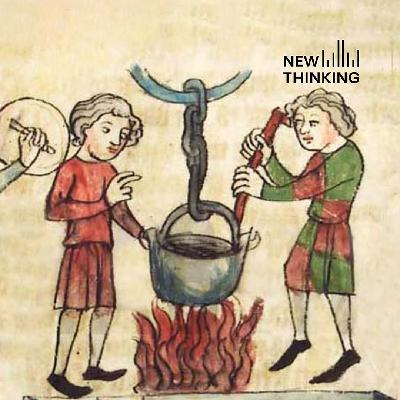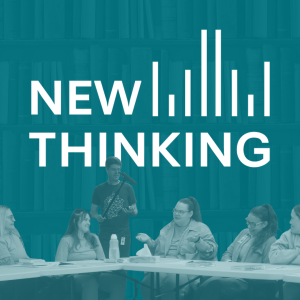Discover New Thinking, from the Center for Justice Innovation
New Thinking, from the Center for Justice Innovation

New Thinking, from the Center for Justice Innovation
Author: Center for Justice Innovation
Subscribed: 317Played: 2,677Subscribe
Share
©2019 Center for Court Innovation
Description
New Thinking is a podcast about justice—and injustice—in America. It’s about the people working to fix a justice system that falls so short of our ideals, and the people organizing to build something new in its place. It’s hosted by Matt Watkins and produced by the Center for Justice Innovation (formerly Center for Court Innovation).
224 Episodes
Reverse
Emily Galvin Almanza says, for the most part, the criminal justice system has only one setting: punishment. But punishment isn’t safety. It isn’t even accountability.
Galvin Almanza makes that case in her new book, The Price of Mercy: Unfair Trials, a Violent System, and a Public Defender’s Search for Justice in America.
But the book isn’t only about problems; it’s also about solutions.
“We don’t have to fall prey to the worst aspects of our history,” contends Galvin Almanza. “We can build something better.”
Full show notes
This is a story, not so much of forgiveness, but of something richer, more complicated, and even more deeply human.
A story about moving forward after the worst loss imaginable, with the person who thrust that loss upon you.
Hear from Jacob Dunne, whose one punch killed 28 year-old James Hodgkinson outside of a bar in Nottingham, England; from James’s parents, Joan Scourfield and David Hodgkinson; and from Nicola Fowler, the restorative justice facilitator who has been a part of their journey since its beginning.
‘Punch,’ the play based on their story, has just opened on Broadway.
Full show notes (photos + transcript)
Learn more about how the Center for Justice Innovation is using restorative justice to respond to instances of serious harm and violence.
Learn more about the Manhattan Theatre Club production of ‘Punch.’
Learn more about the Common Ground Justice Project that Jacob, Joan, and David are collaborating on.
Vicarious trauma is the trauma you absorb working with traumatized people, especially when you’re both inside of already traumatizing systems. Treatment not jail, diversion from harmful system-contact… Making justice reform work on the ground relies on an abundance of frontline staff: from mental health counsellors to peer mentors. But many of those staff, at our organization and at others like us, are hurting: navigating human suffering—trauma—on all sides.
Full show notes
Think of probation as an enormous testing period: will you be able to adhere to the thicket of conditions governing your daily life? Fail at any of them and you could be sent to prison. At the heart of this testing ethos is drug testing: almost all of the almost three million people on probation in the U.S. are drug tested—peeing in a cup, generally under the observation of a probation officer. The tests are time-consuming, expensive, and traumatic. There is also little evidence justifying their use.
Full show notes
Special issue of the Federal Sentencing Reporter on drug testing and supervision
Hear our 12/23 episode: ex-NYC probation commissioner Vinnie Schiraldi calls for probation’s “incremental abolition”
A brief, moving excerpt from the recent award ceremony at the New York Public Library announcing the inaugural winner of the Inside Literary Prize, the first major U.S. book award to be judged exclusively by people who are incarcerated.
Hear from Freedom Reads founder and CEO Reginald Dwayne Betts, and from this year’s winner…
And please be sure to listen to our earlier episode, profiling the work of some of the judges for this prize: ‘Inside Literary Prize: Shakopee Women’s Prison.’
“They actually care. They want to hear about what we think, the ones that they have shut away.”
The Inside Literary Prize is the first major U.S. book award to be judged exclusively by people who are incarcerated, some of the most prolific readers in the country.
Yet the walls we erect around incarcerated people also disappear them from conversations about culture, politics, and history—conversations to which they can make vital contributions.
In this special episode, hear a behind-the-scenes portrait of what a day of judging sounded like in Minnesota’s Shakopee women’s prison.
Full show notes
What would it mean to decriminalize mental health—to stop criminalizing the symptoms of what is very often untreated mental illness? And what would it mean to put racial justice at the center of that effort? The outcomes of the criminal legal system being what they are, those two questions are really inseparable.
Full show notes
Three years ago, Oregon broke with the War on Drugs, decriminalizing the possession of most illicit drugs. The measure promised instead a “health-based approach.” But the legislature has just ended the short-lived experiment.
The law met stiff headwinds from the start: from the arrival of fentanyl on the West Coast to a relentless opposition campaign.
But part of what went wrong was a challenge for any legislation: implementation. How do you make a sweeping new approach work on the ground?
Morgan Godvin was at the frontlines of Oregon’s decriminalization fight. “We have come to a fork in the road,” she says. For now, progress towards an evidence-based approach to drug use “has fallen prey to fear-based policy.”
Full show notes
Vincent Schiraldi used to run probation in New York City; now he’s asking whether probation should even exist. Schiraldi says some of the roots of mass supervision—and its connection to mass incarceration—can be found in a surprising place: the Supreme Court’s 1963 Gideon decision. It recognized, but failed to adequately support, a poor person’s right to a lawyer.
Hear the final episode in our “Gideon at 60” series.
Full show notes
A profile of the fight to secure lawyers for people facing eviction and the radical impact that is having in Housing Court. With its 1963 Gideon decision, the Supreme Court guaranteed a lawyer to any poor person facing prison time. For criminal cases, the decision was both sweeping and critically incomplete. On the civil side, the campaign for a right-to-counsel is taking a different approach—it’s slow and piecemeal, but it’s also working.
This is the second episode in our series on the legacy of the Gideon decision. Hear the first episode here.
Full show notes
As the legal scholar Paul Butler wrote ten years ago, “On every anniversary of Gideon, liberals bemoan the state of indigent defense.” On this 60th anniversary of the landmark Supreme Court decision granting a lawyer to every poor defendant facing prison time, there is much to bemoan. Yet as the harms of the criminal legal system come into sharper relief, there is a larger question: even if Gideon‘s promise was fulfilled, how much would that change who principally suffers under the current system: the poor and people of color?
Full show notes
April Barber Scales was a pregnant 15-year-old when she received two life sentences; Anthony Willis was 16 when he was sent away for life. After more than 25 years behind bars, they each received something desperately rare: clemency. They describe how they fought against a prison system that “sets you up for failure.” We also hear from an organization in Baltimore that works exclusively with young people at high risk of violence. Rather than arrests and incarceration, what do these young people need?
Full show notes
A recent two-day training for Manhattan prosecutors was a drumbeat on the harms of incarceration; hardly the typical message prosecutors receive. The training was part of a wider effort by D.A. Alvin Bragg to expand the use of alternatives such as treatment and restorative justice. But in a newly cramped climate for criminal justice reform, can that effort become a reality?
Full show notes
Housing is a human right. What if we designed our systems—beginning with Housing Court—to embody that? Given the current eviction crisis, it’s a far-off concept, but there’s work to make it a reality in pockets across the country. In this special episode, hear a profile of one of those efforts in a Brooklyn neighborhood.
Full show notes
Nominated for a Media for a Just Society award, revisit New Thinking’s conversation with activists Victoria Law and Maya Schenwar. In their book, Prison By Any Other Name, Law and Schenwar contend that much of what is packaged today as “reforms” to the criminal legal system are extending, not countering, that system’s harmful effects. So what is the ultimate goal of reform of a system like the criminal legal system?
Full show notes
Efforts to reform the justice system often tout they’re “evidence-based” or “data-driven.” But at a moment when a national increase in crime, likely triggered by the pandemic, seems to have put the reform movement on its heels, why do arguments based on data rarely seem to win the day? Guests Christina Greer and John Pfaff are both scholars and frequent media commentators working at the intersection of criminal justice data and politics.
Full show notes
Hear Pfaff on New Thinking as part of our series on Prosecutor Power
New York City has committed to closing its notorious Rikers Island jail facility by 2027. That could dramatically reorient the city’s approach to incarceration. The plan envisions a citywide jail population of just over 3,000 people. But the population at Rikers has been growing for months, and Rikers itself is engulfed in crisis amidst a historic spike in deaths. What are the prospects for finally getting Rikers closed?
Full show notes
Eyal Press contends there are entire areas of life we’ve delegated to “dirty workers”—functions we’ve declared necessary, but that we strive to keep hidden. In his new book, Dirty Work: Essential Jobs and the Hidden Toll of Inequality in America, Press points to the transformation of jails and prisons into the country’s largest mental health institutions. He calls the people struggling to offer treatment in those settings “dirty workers”—not because their work isn’t noble, but because collectively we’ve put them in a situation where it’s impossible to practice ethical care.
Full show notes
Hear a related New Thinking episode with Homer Venters, the former chief medical officer for NYC Jails.
Justice reforms often exclude people with charges involving violence, even though these are the same people most likely to be incarcerated and to be in the most need of the programs and treatment reform can bring. But a felony court in Manhattan is offering alternatives to incarceration, regardless of charge. Can a treatment-first approach be brought to scale inside of the same system responsible for mass incarceration in the first place?
Full show notes
An audio snapshot from an emergency rally demanding immediate measures to release people from New York City’s Rikers Island jail. Eleven people have died in the custody of the city’s jail system this year as Rikers’ chief medical officer warns of “a collapse in basic jail operations.”









